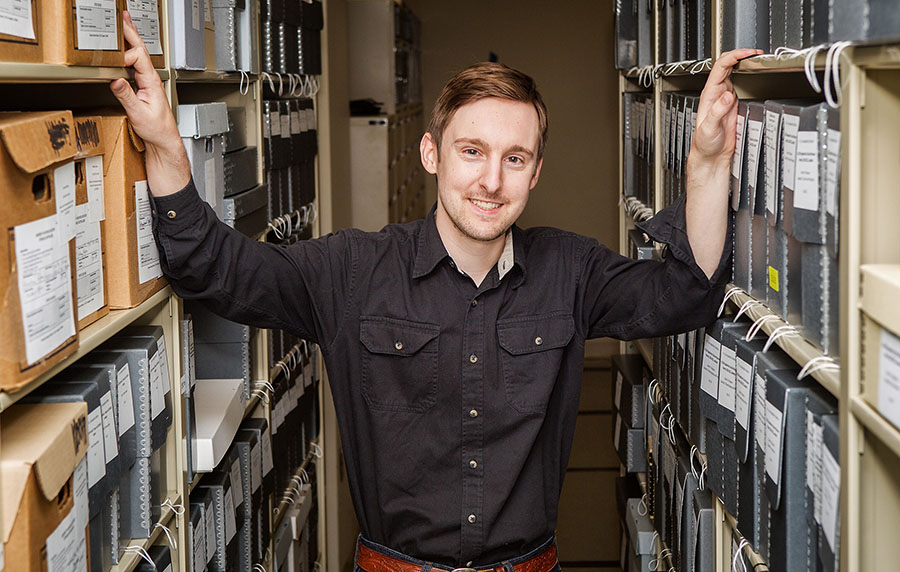Trevor McKenzie ’10 ’12 turned his childhood interest in the Appalachia region into a career as an archivist in the W.L. Eury Appalachian Collection in Belk Library and Information Commons.
McKenzie graduated from Appalachian State University in 2010 with a degree in history, then remained at the university to earn a master’s degree in Appalachian studies in 2012.
He began his career as an archivist. It was through this position that he became involved in the making of “After Coal,” a documentary that draws parallels between coal mining towns in Wales and Appalachia. He processed a portion of papers by Helen Lewis, a scholar and community organizer who is featured in the documentary.
However, his key role in the making of the film began post-production. Along with alumna Rebecca Jones ’09 ’11, he recorded several fiddle, banjo and guitar versions of the song “Looking for the Stone” to be used in the documentary.
RELATED: Documentary ‘After Coal’ premieres in U.S. and U.K. film festivals
“I had never worked on a soundtrack for a film. It’s definitely a positive for my career as both a musician and an archivist to have been involved in the film,” he said.
While taking an Appalachian studies class in high school in Rural Retreat, Virginia, McKenzie learned about Appalachian State University and its host of scholars and professors studying the history, literature, geology, folklore and music of the region.
“It was unlike any history or literature course I had ever heard of. For the first time in a classroom, I saw local events, people and places valued as much as the great events of history. In addition, I had friends who were traditional musicians who had played at Appalachian at varying times and spoke highly of its collections of regional music,” McKenzie said.
McKenzie’s time at Appalachian
McKenzie decided to attend Appalachian because of the W.L. Eury Appalachian Collection and the Appalachian Cultural Museum, which closed in 2011. He chose to study public history due to his interest in the museum, but also because the program appealed to his interest in old manuscripts and material culture.
After finishing his undergraduate program in just three years, McKenzie continued with his interest in the Appalachia region and earned a master’s in Appalachian studies.
His thesis for his master’s was a biography of Otto Wood, an outlaw from North Carolina’s Wilkes County who lived from the mid-1890s until he was shot in Salisbury, North Carolina, in 1931.
“I was introduced to Wood’s story through a friend, Herb Key, a notable musician, singer and luthier also from Wilkes. He had a collection of newspaper clippings on Wood spanning 30 years, which I used to write a paper as an undergraduate. The story would not let me go and I revisited it in depth for my graduate thesis. Wood was both a modern criminal and a folk hero who inspired several ballads recorded in the early days of country music,” McKenzie said.
McKenzie’s full thesis, “‘Robin Hood of the Blue Ridge:’ The Life, Legend, and Songs of Otto Wood the Bandit,” can be read either online or in the W. L. Eury Appalachian Collection.
While earning his master’s, McKenzie completed an internship with Dr. Sandra Ballard as editorial assistant for Appalachian Journal, an academic journal on the Appalachian region.
“The office hosts a revolving door of authors, historians, folklorists, filmmakers, etc. who just drop in to visit. The amount of knowledge and notable people who move in and out of that office on a regular basis is amazing,” McKenzie said.
His work today
In his current role at the W. L. Eury Appalachian Collection, McKenzie is involved in accessioning, processing and preserving documents, field recordings and other materials related to the history of the Appalachian region. Part of his job includes making sense out of collections that come to the library from less than ideal places, such as barns, sheds or attics. McKenzie retrieves collections from these places, freeze dries dirtier items to kill mold and bugs and determines an original order to the collections.
“The work I do is rewarding in that no day is exactly routine and I constantly get to be one of the first to read and touch historic manuscripts and hear recordings as they come in,” he said.
McKenzie calls Appalachian a special location because of the large amounts of talent, skill, tradition and wisdom that come out of both the university and the surrounding communities.
What do you think?
Share your feedback on this story.
What happens when fossil fuels run out? How do communities and cultures survive?







![How NCInnovation Is Rethinking Economic Development in North Carolina [faculty featured]](/_images/_posts/2026/02/rethinking-economic-development-600x400.jpg)






